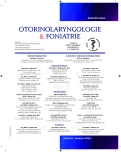-
Medical journals
- Career
Psychogenic Disorder on Hearing in Children
Authors: D. Hošnová 1; K. Janhuba 2; L. Lavička 3; I. Šlapák 1
Authors‘ workplace: Klinika dětské otorinolaryngologie LF MU a FN, Brno 1; Ambulance dětské psychiatrie a klinické psychologie LF MU a PDM FN, Brno 2; ENT med., s. r. o., Brno 3
Published in: Otorinolaryngol Foniatr, 64, 2015, No. 4, pp. 213-218.
Category: Case Reports
Overview
Psychogenic disorders of hearing are conditions of subjectively perceived hearing loss of various degrees, which are not demonstrable by objective methods of examination. The papr presents the case of a 16-year old boy who appeared at the Clinic of Child Otorhinolaryngology, Medical Faculty, Masaryk University Brno and Faculty Hospital Brno with bilateral hard hearing impairment. A psychogenic hearing impairment became suspected only in connection with virtually absent symptomatology after the administration of anxiolytic pretreatment before the intervention in general anesthesia (bilateral introduction of Microwick), when the patient started to react to an ordinary speech level. Objective methods of examination used in outpatient ward failed for lack of cooperation during examination (disturbance, hyperventilation). In condition s of general anesthesia a physiological hearing threshold was confirmed on the right ear as well as a light hearing impairment on the left ear. Circumstantial evidence during psychiatric examination referred to psychogenic etiology as well..
Keywords:
pseudo hypoacusis, psychogenic hearing impairment, dissociation
Sources
1. Austen, S., Lynch, C.: Non-organichearinglossredefined: understanding, categorizing and managing non-organicbehaviour. Int. J. Audiol., 43, 2004, 8, s. 449-457.
2. Drouillard, M., Petroff, N., Majer, J. et. al.: Pseudohypacusis in children: circumstances and diagnosticstrategy. Int. J. Pediatr. Otorhinolaryngol.,78, 2014, 10, s. 1632-1636.
3. Holenweg, A., Kompis, M.: Non-organichearingloss: new and confirmedfindings. Eur. Arch. Otorhinolaryngol., 267, 2010, 8, s. 1213-1219.
4. Hosoi, H., Tsuta, Y., Murata, M. et. al.: Suggestion audiometry for non-organichearingloss (pseudohypoacusis) in children. Int. J. Pediatr. Otorhinolaryngol., 47, 1999, 1, s. 11-21.
5. Rotenberg, B. W., Makhija, M., Papsin, B. C.: Conversiondisorder in a childpresenting as suddensensorineuralhearingloss. Int. J. Pediatr. Otorhinolaryngol., 69, 2005, 9, s. 1261-1264.
6. Schmidt, C. M., amZehnhoff-Dinnesen, A., Matulat, P. et. al.: Nonorganichearingloss in children: audiometry, clinicalcharacteristics, biographicalhistory and recoveryofhearingthresholds. Int. J. Pediatr. Otorhinolaryngol., 77, 2013, 7, s. 1190-1193.
7. Tress, W., Krusse, J., Ott, J.: Základní psychosomatická péče. Portál, s.r.o., Praha, 2008, ISBN 978-80-7367-309-3.
Labels
Audiology Paediatric ENT ENT (Otorhinolaryngology)
Article was published inOtorhinolaryngology and Phoniatrics

2015 Issue 4-
All articles in this issue
- Incidental Parathyroidectomy in Surgical Treatment of Thyroid Gland Diseases
- Increasing Incidence of HPV Related Oropharyngeal Cancers
- Psychogenic Disorder on Hearing in Children
- Inflammatory Pseudotumor of Temporal Bone
- Papillary Carcinoma in a Medial Cervical Cyst
- Value of Narrow Band Imaging (NBI) in Management of Leukoplakia
- Surgical Treatment of Rhinophyma
- Infrared Lasers versus Classical Technique in Tonsillectomy
- Otorhinolaryngology and Phoniatrics
- Journal archive
- Current issue
- Online only
- About the journal
Most read in this issue- Inflammatory Pseudotumor of Temporal Bone
- Increasing Incidence of HPV Related Oropharyngeal Cancers
- Psychogenic Disorder on Hearing in Children
- Papillary Carcinoma in a Medial Cervical Cyst
Login#ADS_BOTTOM_SCRIPTS#Forgotten passwordEnter the email address that you registered with. We will send you instructions on how to set a new password.
- Career

